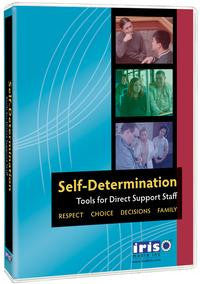
Self-Determination Tools for Direct Support Staff: Respect, Choice, Decisions, Family
The Ally, the Smotherer, and the Slacker— 3 common roles assumed by support staff when confronted with questions about self-determination. Through careful examination of each role, this program teaches skills to staff so they can become allies of the people they support. 4 strategy modules plus 24 practice vignettes provide opportunity to rehearse and practice effective strategies.
What would you do if an adult with developmental disabilities wants to do something you think is wrong or dangerous, or something you don't agree with? How would you balance your own feelings and opinions with the individual's desires? Funded by a research and development grant from the National Institutes of Health, this program teaches specific skills and strategies direct support staff can use to promote self-determination.
5 modules:
- Developing Respectful Relationships. Opportunities for enhanced self-determination will only occur in a relationship built on mutual trust and respect between the individual with disabilities and the support person.
- Encouraging Choice-Making. Strategies for eliciting choices and supporting good choice-making include helping people get information about alternatives in an unbiased manner and encouraging people to think about outcomes of choices.
- Promote Informed Decisions. How to define the decision, generate possible solutions, consider outcomes and checking out results of decisions.
- Planning for the Future & Working with Families. How to support people with the process of clarifying their dreams, setting goals, making plans, tracking progress in reaching the dream and planning for the future. Includes how to work with families to achieve a plan that family members support.
- What Would You Do? 24 video vignettes of common situations, ending with the question "What would you do?" - to elicit staff discussion about behaviors that support self-determination.
90 minutes. Includes a 38-page Viewer’s Guide.
